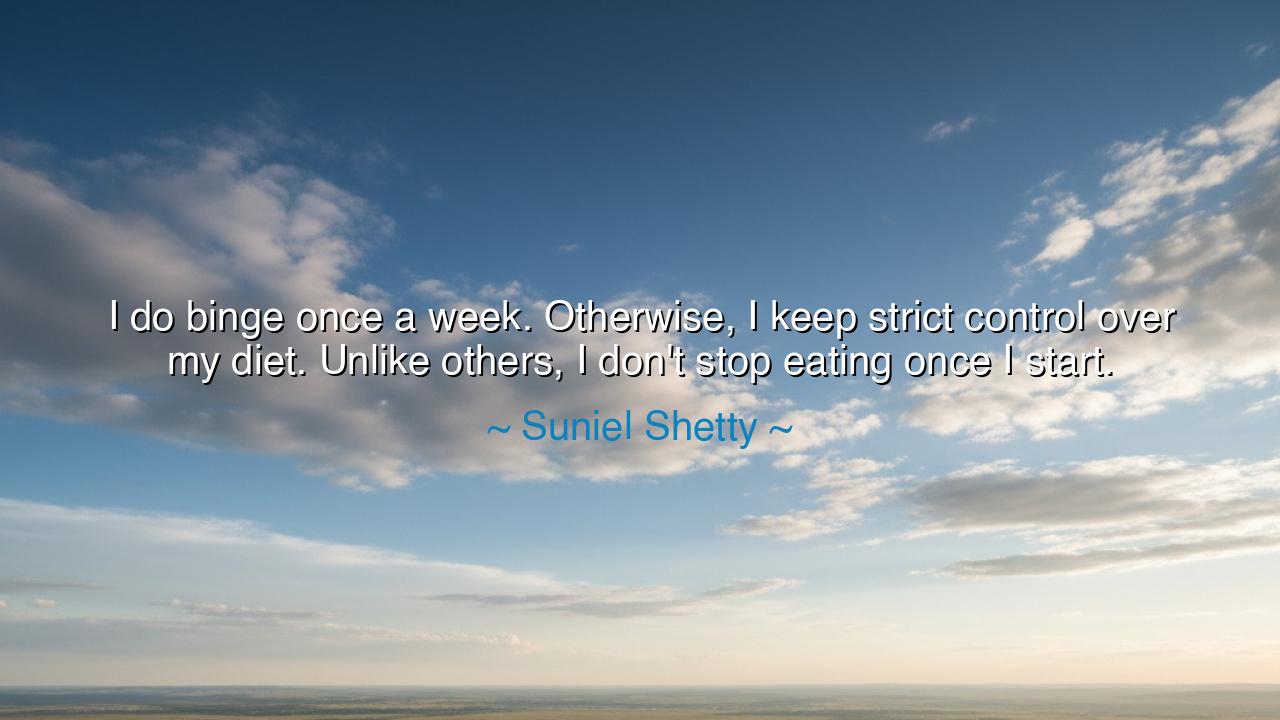
I do binge once a week. Otherwise, I keep strict control over my
I do binge once a week. Otherwise, I keep strict control over my diet. Unlike others, I don't stop eating once I start.






The actor and athlete Suniel Shetty, a man known for his discipline and strength, once said: “I do binge once a week. Otherwise, I keep strict control over my diet. Unlike others, I don’t stop eating once I start.” Though spoken in the context of fitness, these words are a reflection on the balance between indulgence and restraint, between the freedom of desire and the mastery of self. Beneath their simplicity lies an ancient truth: that discipline is not the denial of pleasure, but its guardian. Shetty’s insight is the wisdom of one who understands that the body, like the spirit, must be ruled with both firmness and mercy.
When he admits that he “binge[s] once a week,” he reveals not weakness, but humility and awareness. He does not pretend to be beyond temptation, for no human being is. Instead, he recognizes the natural rhythm of human appetite — the ebb and flow between control and release. The disciplined man does not seek to extinguish desire, for that would make him hollow; rather, he seeks to master it, to direct its power rather than be consumed by it. His once-a-week indulgence is not surrender — it is a conscious act of balance, a reminder that even within order, there must be grace.
This philosophy echoes the teachings of the Stoics of ancient Greece and Rome, who believed that true freedom lies not in the absence of desire, but in command over it. The philosopher Epictetus taught that man should treat his appetites as a rider treats a wild horse — with patience, strength, and calm. If the rider fights the horse, both perish; but if he learns to guide it, they reach their destination together. So too does Suniel Shetty’s approach reflect this harmony: he allows himself to indulge, not as a slave to appetite, but as its master. The weekly “binge” becomes not a fall from grace, but a reminder that the body is a friend to be cared for, not a foe to be conquered.
Yet, his words carry a deeper warning in the line, “I don’t stop eating once I start.” Here speaks the voice of self-awareness, that rarest of virtues. He knows his own weakness, and through that knowledge, finds his strength. The ancients held that wisdom begins not in victory, but in knowing oneself. The warrior who knows his limits fights wisely; the one who denies them perishes in arrogance. In the same way, Shetty’s confession reminds us that mastery of the self begins with honesty. Only the one who recognizes his tendencies — who admits his excesses, his hungers, his vulnerabilities — can begin to rule them.
Consider the story of Alexander the Great, who conquered much of the known world but was, for a time, enslaved by his own temper. His tutor, Aristotle, warned him that the man who cannot rule himself cannot rule others. When Alexander learned moderation — when he turned his fiery nature into disciplined purpose — his empire grew not through brute force, but through vision and restraint. This lesson applies to all: whether one commands armies or one’s own body, self-control is the truest form of power. Shetty’s discipline, born from understanding his nature, follows this same eternal law.
The lesson, then, is one of balance and honesty. Every human being wrestles with desire — for food, for success, for pleasure. The goal is not to destroy desire, for it is the fire that drives creation, ambition, and joy. Rather, the goal is to learn when to feed it and when to let it hunger. As Suniel Shetty teaches, discipline is not deprivation, but direction. To live well, one must learn to say both “yes” and “no” — not as reaction, but as choice. Allow yourself moments of freedom, but let structure be your constant companion.
So, my friends, remember this ancient truth: he who rules his appetite rules his destiny. Whether the appetite be of the flesh, the mind, or the heart, mastery over it determines the shape of one’s life. Be firm, but not cruel with yourself. Enjoy the feast when it is time, but return swiftly to discipline when the feast is done. For the body and soul, when trained in harmony, become instruments of greatness. As Suniel Shetty reminds us, strength is not found in perfection, but in the wisdom to control what can be controlled — and the grace to accept what must be lived.






AAdministratorAdministrator
Welcome, honored guests. Please leave a comment, we will respond soon